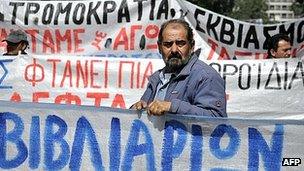Eurozone crisis: Fear returns
- Published
- comments

The Greek bailout bought some time - but there is still anger on the streets
Just a few weeks ago the head of the IMF, Christine Lagarde, looked at Greece and declared "economic spring is in the air".
Others were equally optimistic. The French President, Nicolas Sarkozy, said "I want to tell the French people that the page of the financial crisis is turning. Today the problem is solved."
The President of the European Council, Herman Van Rompuy, was equally upbeat when he said "the turning point in the crisis has been reached". The EU's Economics Commissioner Olli Rehn chimed in with "the risk of explosion is behind us".
Such bursts of optimism now seem foolishly premature. The eurozone is once again rattling financial markets. The main reason is Spain. Its borrowing costs have shot up to close to 6% - levels not seen since January.
The EU had set Spain the target of reducing its deficit to 4.4% this year. The new government in Spain said such a reduction could not be achieved. It suggested 5.8%. After some arm-twisting from Brussels the figure of 5.3% was settled on.
But the word was out there - the Spanish government doubted the targets could be achieved this year, let alone the more ambitious target of 3% by 2013.
For the second time in three years Spain is in a recession.
The economy is expected to shrink by 1.7% this year, although others think the fall might be more severe.
Unemployment is close to 24% and rising. There are 1.6 million households without a wage earner. Against this background the government has announced savings of 27bn euros (£22bn; $35bn). It has fuelled anxiety that Spain is at risk of falling into a downward spiral.
Even at the best of times cutting spending in the teeth of a recession would be difficult enough, but Spain is still nursing a dangerous hangover from its property crash. The banks hold around 180bn euros of troubled property assets. They are desperately trying to offload property, but house prices which have fallen by nearly 25% are still going down.
And then there are the semi-autonomous regions. They are responsible for two-thirds of the problems with the budget. It is not yet clear how they will be coerced into cutting spending on health and education, although the government in Madrid has made a start.
There are some green shoots. Exports are rising. Some labour reforms are in place. But the big question that haunts the markets is whether Spain will be able to survive the year without a bailout either of the government or of the banking sector. It helps, however, that Spain has already financed half of its borrowing for this year.
Greek uncertainty
And then there are other causes of anxiety. Later today a Greek election will be announced; the most likely date is 6 May. The fear is that the winners will not be the two parties that signed up to the terms of the latest bailout deal, but an array of fringe parties who no longer believe that austerity is working.
Not only could Greece become politically unstable but there could be a majority in parliament opposed to the further spending cuts that Brussels insisted on as a condition for the second bailout.
Such is the concern that the German finance minister even suggested that Greece postpone the elections. That produced the withering response from a senior economist: "you don't control our destiny".
And even a casual observer will have detected that Greece is edging towards instability.
The tragic and public suicide of a pensioner; the bombing of two buildings in central Athens; the attack by a crowd on a policeman; the injuring of photographers by police officers in a riot; dock workers, at a key moment in the tourist season, are on strike.
The eurozone is, too, watching the French elections. The first round will be on 22 April, with the run-off on 6 May. President Sarkozy has edged in front for round one, but all the polls suggest that the Socialist candidate Francois Hollande will win in round two.
Mr Hollande wants to renegotiate the pact that enforces much greater budgetary discipline in the eurozone. The pact was championed by Germany's Angela Merkel, who sees it as the foundation stone to long-term stability.
Most importantly Francois Hollande believes that the emphasis must shift away from austerity to growth. With an Hollande victory the French and Germans could have fundamentally different views on how to solve Europe's crisis at a critical moment.
Expect the eurozone crisis to feature strongly in the Sarkozy campaign. Already his team are warning that an Hollande victory would be "a one-way ticket to Greece".
And then there is Italy. It, too, has seen its borrowing costs edge back up and its stock market fall steeply. The honeymoon period for Prime Minister Mario Monti is well and truly over. Key reforms to shake up the labour market to make it easier to hire and fire have been watered down. They are a step forward, but they do not convince. And Italy too is heading for recession.
And that brings us back to the fear that stalked Europe for so much of last year. If Spain and Italy get into trouble how will they be bailed out? The main rescue fund - the so-called firewall - has been strengthened, but it is not big enough to rescue such big economies as Italy and Spain.
That is why investors are on edge again.